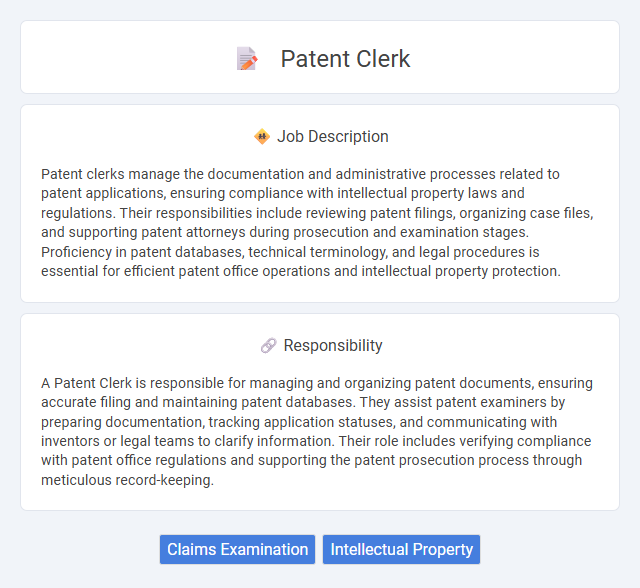
Patent clerks manage the documentation and administrative processes related to patent applications, ensuring compliance with intellectual property laws and regulations. Their responsibilities include reviewing patent filings, organizing case files, and supporting patent attorneys during prosecution and examination stages. Proficiency in patent databases, technical terminology, and legal procedures is essential for efficient patent office operations and intellectual property protection.
Individuals with strong attention to detail and an interest in intellectual property might find the role of a Patent Clerk suitable. Those who enjoy researching, organizing complex information, and have patience for meticulous documentation are more likely to thrive. Conversely, people who prefer dynamic, high-interaction tasks might find this position less engaging.
Qualification
Patent clerks typically require a background in science, engineering, or law, often holding a bachelor's degree in fields such as biology, chemistry, mechanical engineering, or intellectual property law. Strong analytical skills and knowledge of patent databases, patent application processes, and legal terminology are essential qualifications. Certification or coursework in patent law and experience with document management systems enhance a candidate's qualifications for a patent clerk role.
Responsibility
A Patent Clerk is responsible for managing and organizing patent documents, ensuring accurate filing and maintaining patent databases. They assist patent examiners by preparing documentation, tracking application statuses, and communicating with inventors or legal teams to clarify information. Their role includes verifying compliance with patent office regulations and supporting the patent prosecution process through meticulous record-keeping.
Benefit
Patent clerks likely benefit from gaining specialized knowledge in intellectual property law and patent documentation, which can enhance career prospects in legal and technical fields. The role probably offers opportunities for structured work environments and stable employment in government or corporate settings. This position may also provide the chance to develop strong organizational and analytical skills valuable for future advancement.
Challenge
A Patent Clerk may often face the challenge of accurately interpreting complex legal and technical documents, which requires a strong attention to detail and specialized knowledge. There is a probability of encountering tight deadlines that demand efficient time management and prioritizing skills. The role might also involve navigating evolving patent laws and regulations, adding to the complexity of ensuring compliance.
Career Advancement
Patent clerks play a crucial role in intellectual property law by managing patent applications and maintaining detailed records. Career advancement opportunities include becoming patent examiners, intellectual property attorneys, or patent agents, which require specialized legal knowledge and additional certifications. Developing expertise in patent law and gaining experience with complex patent portfolios significantly enhances prospects for promotion and leadership roles within law firms or corporate IP departments.
Key Terms
Claims Examination
Patent clerks specializing in claims examination meticulously review patent claims to ensure they meet legal and technical standards, verifying novelty and compliance with patent laws. They analyze prior art, assess the scope of protection sought, and assist in drafting precise claim language to avoid ambiguity. Their expertise supports patent examiners by streamlining the patent granting process and minimizing the risk of infringement disputes.
Intellectual Property
A Patent Clerk plays a crucial role in managing and processing patent applications within Intellectual Property law, ensuring all documentation complies with legal standards. They assist patent attorneys by conducting prior art searches, preparing official correspondence, and maintaining patent databases to protect innovations. Expertise in patent classification systems and a strong understanding of IP regulations are essential for efficient patent prosecution and safeguarding inventors' rights.
 kuljobs.com
kuljobs.com